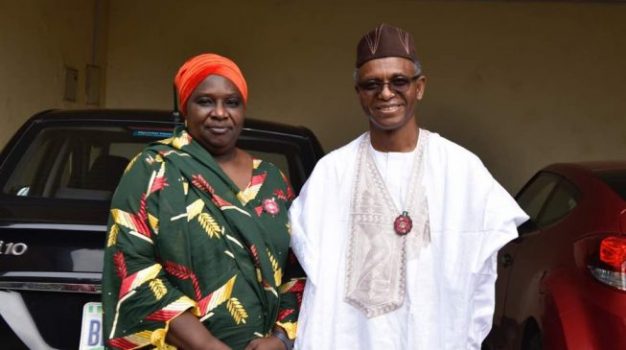 Kaduna State governor, Mallam Nasir El-Rufai on Tuesday defended his choice of a fellow Muslim as his running mate for the 2019 election, saying that the Government House was not a place of worship but a place of work.
Kaduna State governor, Mallam Nasir El-Rufai on Tuesday defended his choice of a fellow Muslim as his running mate for the 2019 election, saying that the Government House was not a place of worship but a place of work.
He also said he consulted President Muhammadu Buhari before choosing Dr. Hadiza Balarabe, a Muslim from Sanga Local Government Area in the southern part of the state.
The development had attracted mixed reactions, with many people accusing him of being insensitive to the cultural and religious diversity in Kaduna State.
Speaking when a delegation from Sanga Local Government Area led by their traditional ruler, the Etum Numana, Brig. Gen. Aliyu Yamma (rtd) paid him a thank you visit for choosing their daughter as his running mate, El-Rufai said those criticizing him for his choice are people who never voted for him.
According to the governor, Hadiza beat 31 other candidates during the selection process to emerge. He also disclosed that about a year ago, the current Deputy Governor, Mr. Barnabas Bala Bantex told him that he was going to contest for the Senate.
“So, we started piling list of people for consideration and I had up to 32 names including names of some people seated with me here today. Then we started selection and dropping of names based on merit.
“From 32 names to 17 to 12 and then 5 names, three males and two females. At that point and as usual of us, when we are taking serious decisions we consult President Muhammadu Buhari because he is the only person I know that has worked in the army, he has been governor, minister and president.
“So, when I told him, he said anyone older than you should be dropped, then one name was dropped, remaining two men and two women, then he said, since you are interested in a woman pick the best woman. That was how I picked Hadiza because she was the best,” the governor said.
He added: “From the beginning, I had told my team that I will never choose or deny anyone appointment because of religion or ethnicity. But some people started all manner of things, ‘Muslim-Muslim ticket’ and so on.
“But Government House is not a place of worship. We come here to work for the people. The people that have criticized me most on this are people who never voted me in the first place.
“So, are they not supposed to be celebrating if in their own opinion, I have made a wrong choice? Then, why are they mourning?”
Hoever, a renowned Kaduna-based Islamic cleric, Ahmad Gumi is of the opinion that the state is not ripe for a Muslim-Muslim governorship ticket going by its culture and environment.
Speaking with journalists on Tuesday, Sheikh Gumi said such moves could create more tension in the violence-prone state, adding that people of other ethnic groups and religions should be assimilated and not pushed out.
According to Gumi, there was a need for the minority indigenous people to be given political representation in any state depending on their population.
Gumi said: “Everybody knows that it’s politically motivated. Everybody knows that. What I’m saying and I specifically said is that you look at the time, the situation, the culture, the environment before you make such a move.
“What I feel is that it’s not yet the time. It is not right especially coming a week after some people lost lives innocently. Somebody is killed on the road, why? Because of his identity.
“So, immediately after such a crisis, we don’t need another thing that will create animosity between people that are destined to live together and I specifically said indigenous people.
“If we have indigenous people, we should do everything possible to assimilate them, integrate them, not to castigate them and put them out.
“They brought the argument that this thing is happening in Plateau and other states and I said yes, this is one reason why we should show them that we don’t take our behaviour and civilization from barbarism. We have a standard.
“Not only in Kaduna. We are now looking for the right of Muslim minorities in Plateau, in Benue, in Nasarawa too, they should be fully integrated into the politics.
“So we should advocate for Muslims where they are minorities to have representation, depending on their population in government and not to deny people who are destined to live together and show them they are outcasts.”

Kano High Court Affirms Suspension of APC’s Abdullahi Ganduje Pending Hearing
Governor Obaseki Appoints Omobayo Godwins As Deputy Governor
Edo State Deputy Governor Philip Shaibu Impeached By State House Of Assembly
NLC Protests At Labour Party Headquarters, Demands Chairman’s Resignation